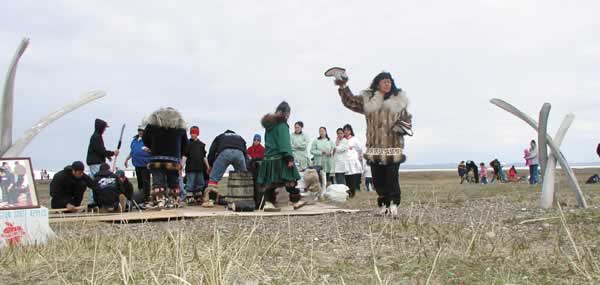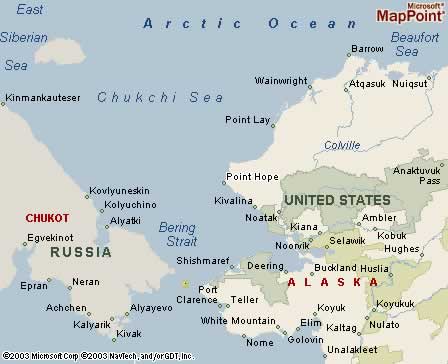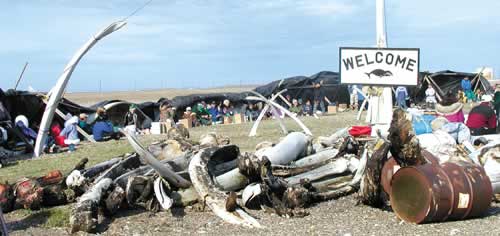 |
|
THE
CAMP - In a matter of a few hours, the men set
up black tarps as windbreakers, turned the skinboats
on their sides to form a half circle, like an
arena. Around the whale bones, the whaling crews
put plywood on the ground to cut the whale's flippers.
|
|
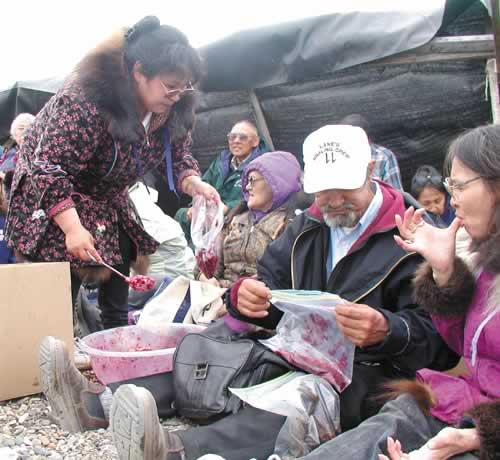 |
|
ZIPLOCS
AND SALMONBERRIES - One item everybody showed
up with was Ziploc bags. George Kingik and Helen
Anderson enjoyed the berries on the spot.
|
|
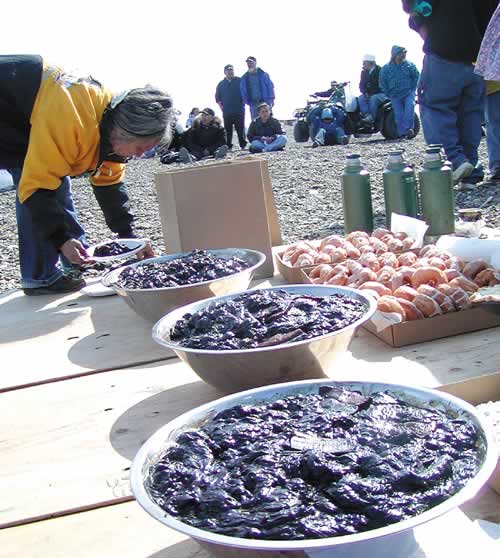 |
|
A
DELICACY - Fermented whale meat and donuts were
on the menu at Point Hope's whaling feast.
|
|
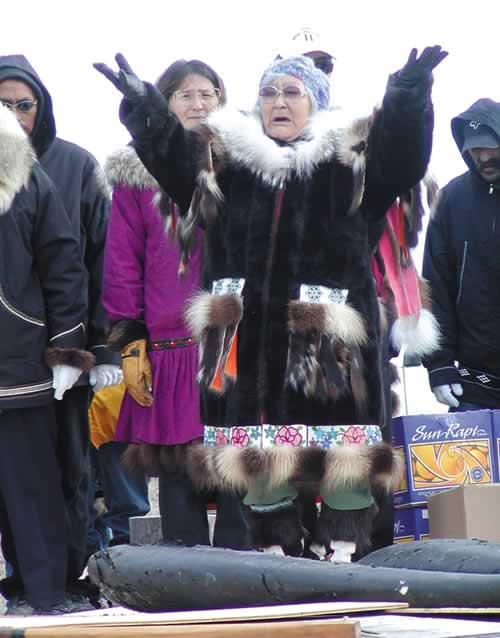 |
|
BLESSINGS
- Whaling captain Eunice Lane blessed the food,
thanked her crew for the gift of the whale and
all the visitors who came from Kotzebue, Selawik,
Noatak, Nome, Brevig Mission and Kivalina.
|
|
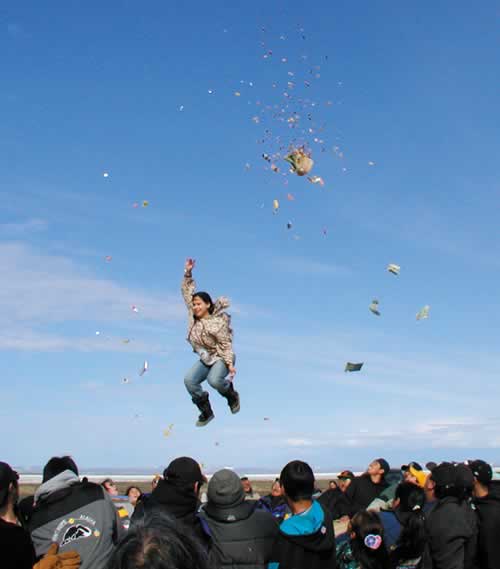 |
|
TOSSING
GIFTS - The blanket toss is done by young mothers
who gave birth to sons in the past year. As they
get tossed up into the air, they throw candies,
furs, blankets and material to a group of older
ladies.
|
|
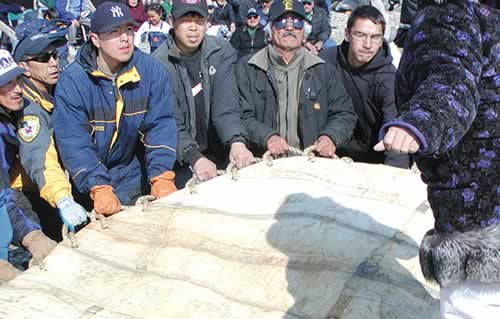 |
|
WORKING
TOGETHER - Part of the whaling feast is the blanket
toss. It takes about 40 people holding on to the
blanket made of the ugruk skins taken from the
whaling skinboat.
|
|
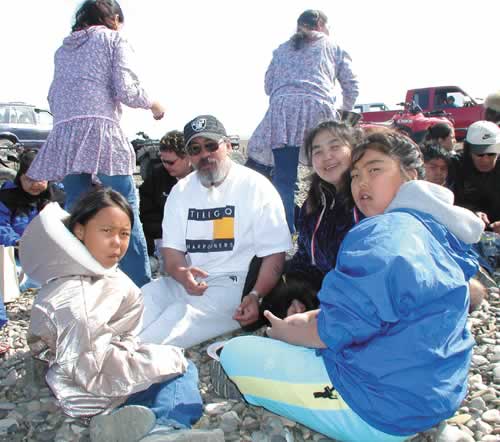 |
| PICNIC
ON THE BEACH - Point Hope Mayor Martin Oktollik,
his wife Carrie and granddaughters Emily (left)
and Lilliann (right). Oktollik instills a sense
of tradition and understanding of their ways to
the young girls. (Photo by Amy Flaherty)
|
Over
night a cold north wind had chased away the blanket
fog that seemed permanently wrapped around Lisburne
Peninsula village of Point Hope. The sun shines and
doesn't seem to move. Time stands still, three days
blend into one. Far off in the distance, beyond the
last remaining snowbanks and the rotting sea ice, in
the distance the Lisburne Hills tower over the tundra
plains.
In the village called Tikigaq, translating into 'pointer'
because of the shape of the sandspit pointing into the
ocean, there is no sign of green. Coarse sand and pebbles
cover the ground and only few tiny plants are courageous
enough to push through the gravel. In the air the salty
sea scent mingles with the sweet and strong smell of
fermented whale meat.
Today is Father's Day, the first day of the Qagruk or
whaling feast. And it is a day of grieving because news
of 13 year-old Josie Frankson's death reached the village.
She died in a hospital in Anchorage of her injuries
sustained in a head-on 4-wheeler collision. Despite
the two completely juxtaposing emotions of celebrating
the life-giving gift of the four whales while mourning
the loss of a young girl, the people dug deep into their
vast reservoir of faith and carried on.
The
day started out in church, where nearly the whole village
came together to pray, to grieve, to give thanks and
spiritually prepare for the next two days of celebration.
Everything is done with prayer, even the beginning of
the hunting season. Says Carrie Oktollik, "Whaling season
started with three bishops coming to town for a visit.
The hunters brought paddles to church in order to have
them blessed." The veil between the seen and unseen,
beliefs and so-called reality appeared especially thin
today.
Ancient traditions are not subject to question or analysis
- they are obeyed and respectfully repeated. Whalers
in Point Hope strongly believe in the connection between
their behavior on land and their whaling success. And
this spring's whaling success makes them proud because
it confirms that their prayers are heard that their
ancient way of life will go on for one more year. It's
all about the intricate net of relationships between
humans and the world around us. The relationship between
hunter and whale reflects the relationship between man
and woman, husband and wife. More than once came the
remark from men such as Rex Rock that "Like my grandpa
used to say: 'I'm just the tool'" in the hunt. It's
the women who maintain the spiritual connection.
Rex
Rock's mother and whaling captain Elijah Rock's wife
Dorcus knows. Her petite physique stands in sharp contrast
to her intense powerhouse energy; her strength and extraordinarily
sharp perception and the ability to look right through
the subject of her attention is almost intimidating.
Like a teenager, Dorcus' long white hair is pulled up
into a ponytail; there is dried blood under her fingernails
from stirring for the second time today mikigaq or fermented
whale meat. Like everybody else in her family clan,
she's busy and hasn't slept in days but still finds
time for a cup of coffee and a conversation.
In addition to being a tribal healer, she's been a whaling
captain's wife for over 30 years and explains the code
of conduct - not only during the time of whaling, but
year around. In a matter-of-factly manner she says,
"You have to be pure in the sense that you behave in
a compassionate, sharing and caring manner. If you don't,
then the whales won't come around, or are too far away
or just don't come close to the boats." Furthermore,
speaking in a firm voice, she continues that she had
to make sure that widows and elders are cared for, that
meat is shared with ladies who have no husbands or sons
to hunt for them. Finally, she says, the wife is the
spiritual connection to the whale.
The
whaling feast revealed many different layers, from the
light-hearted celebration and feasting to tearful praying
and giving until there is no more to give. On the surface,
one could choose to see only the quaint custom of putting
the boats on racks, arranging the oars in a neat and
photogenic manner and passing out the mikigaq at a fun
community picnic. But as the village gathered in both
whaling camps, the Qagmaktuuq Qalqi (clan) on the east
side and the Unasiksikaaq Qalqi on the west side of
town, the feast set the stage for a metaphysical excursion
into a different world of beliefs. Drummer, singer and
village historian Ernie Frankson explained that most
of the rituals, dances or customs came directly from
the whales. For example, the cleaning out of the cellar
- the wives scrub the cellars for the new meat to be
stored - is done because "the whale watches us from
the ocean and when he decides to give his life and take
off his parkie for us, then he wants to rest in a clean
place." Also, the tradition to leave the whale's skull
in the ocean originates in the belief that the whale's
spirit - when taken in spring time - remains with the
whaling captain's family and will leave the family as
soon as the whales come swimming by in fall again on
their southward migration and the spirit "puts on a
new parkie and joins the pod again."
On
this first day of the feast, of course after blessings
and prayers, both camps gave out mikigaq, donuts and
coffee. The villagers gathered around the boats, sat
in a wide circle on the beach gravel. Some brought reindeer
hides, most just sat with outstretched legs on the ground,
but all came with coolers, plastic bags and Ziploc bags,
gathering as much meat and goodies as they could possibly
carry. Some of the meat was immediately consumed on
the spot. Producing ulus and salt out of the coolers,
young and old savored the taste of the precious whale
meat, smiling happily. One old lady named Daisy from
Kotzebue could hardly walk, her hearing totally failed
her, but her whole beautifully wrinkled face was one
big smile as she pointed to her paper plate of mikigaq
and said in a quavering voice, "Whale meat, hmmmmmmm,
I don't get that in Kotzebue. I'm so happy."
The whaling crew's women distributed the meat equally,
making sure that everybody, including the visitors,
got enough to take back home with them. "Even if you
don't like the mikigaq, gather plenty and give it to
the elders," recommended Carrie Oktollik, the mayor's
wife and postmaster of Point Hope. The congregation
scattered as fast as they had gathered just an hour
ago. After all the meat was given out, whole families
climbed back on their 4-wheelers and drove off home,
leaving streaming clouds of dust behind.
The
village laughed and cried at the same time. The sun
betrayed the passing of time and what seemed to be midday
was late evening, there was a singspiration for the
dead girl. The women sang for hours into the night that
was no night. Tomorrow the feast was to continue with
the ceremonial cutting of the whale's flippers, giving
the slices of muktuk away and cleansing the crews of
the whale oil by doing the blanket toss.
Part III next week
|


